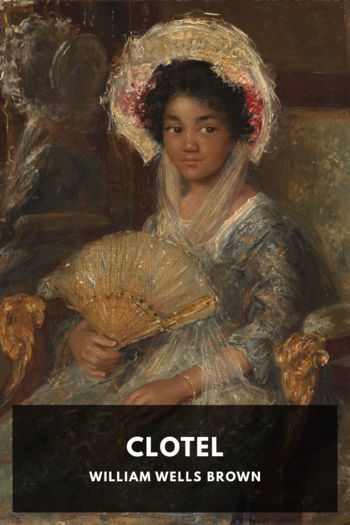Clotel, William Wells Brown [i like reading books .txt] 📗

- Author: William Wells Brown
Book online «Clotel, William Wells Brown [i like reading books .txt] 📗». Author William Wells Brown
⋮
What an incomprehensible machine is man! Who can endure toil, famine, stripes, imprisonment, and death itself, in vindication of his own liberty, and the next moment be deaf to all those motives, whose power supported him through his trial, and inflict on his fellow-men a bondage, one hour of which is fraught with more misery than ages of that which he rose in rebellion to oppose! But we must wait with patience the workings of an overruling Providence, and hope that that is preparing the deliverance of these our suffering brethren. When the measure of their tears shall be full—when their tears shall have involved heaven itself in darkness—doubtless a God of justice will awaken to their distress, and by diffusing light and liberality among their oppressors, or at length by his exterminating thunder, manifest his attention to things of this world, and that they are not left to the guidance of blind fatality.
The same man, speaking of the probability that the slaves might some day attempt to gain their liberties by a revolution, said,
I tremble for my country, when I recollect that God is just, and that His justice cannot sleep forever. The Almighty has no attribute that can take sides with us in such a struggle.
But, sad to say, Jefferson is not the only American statesman who has spoken high-sounding words in favour of freedom, and then left his own children to die slaves.
XVIII The LiberatorWe hold these truths to be self-evident, that all men are created free and equal; that they are endowed by their Creator with certain inalienable rights; among these are life, liberty, and the pursuit of happiness.
Declaration of American IndependenceThe death of the parson was the commencement of a new era in the history of his slaves. Only a little more than eighteen years of age, Georgiana could not expect to carry out her own wishes in regard to the slaves, although she was sole heir to her father’s estate. There were distant relations whose opinions she had at least to respect. And both law and public opinion in the state were against any measure of emancipation that she might think of adopting; unless, perhaps, she might be permitted to send them to Liberia. Her uncle in Connecticut had already been written to, to come down and aid in settling up the estate. He was a Northern man, but she knew him to be a tightfisted yankee, whose whole counsel would go against liberating the negroes. Yet there was one way in which the thing could be done. She loved Carlton, and she well knew that he loved her; she read it in his countenance every time they met, yet the young man did not mention his wishes to her. There were many reasons why he should not. In the first place, her father was just deceased, and it seemed only right that he should wait a reasonable time. Again, Carlton was poor, and Georgiana was possessed of a large fortune; and his high spirit would not, for a moment, allow him to place himself in a position to be regarded as a fortune-hunter. The young girl hinted, as best she could, at the probable future; but all to no purpose. He took nothing to himself. True, she had read much of “woman’s rights;” and had even attended a meeting, while at the North, which had been called to discuss the wrongs of woman; but she could not nerve herself up to the point of putting the question to Carlton, although she felt sure that she should not be rejected. She waited, but in vain. At last, one evening, she came out of her room rather late, and was walking on the piazza for fresh air. She passed near Carlton’s room, and heard the voice of Sam. The negro had just come in to get the young man’s boots, and had stopped, as he usually did, to have some talk. “I wish,” said Sam, “dat Marser Carlton an Miss Georgy would get married; den, speck, we’d have good times.”
“I don’t think your mistress would have me,” replied the young man.
“What make tink dat, Marser Carlton?”
“Your mistress would marry no one, Sam, unless she loved them.”
“Den I wish she would lub you, cause I tink we have good times den. All our folks is de same ’pinion like me,” returned the negro, and then left the room with the boots in his hands.
During the conversation between the Anglo-Saxon and the African, one word had been dropped by the former that haunted the young lady the remainder of the night—“Your mistress would marry no one unless she loved them.” That word awoke her in the morning, and caused her to decide upon this import subject. Love and duty triumphed over the woman’s timid nature, and that day Georgiana informed Carlton that she was ready to become his wife. The young man, with grateful tears, accepted and kissed the hand that was offered to him. The marriage of Carlton and Miss Peck was hailed with delight by both the servants in the house and the negroes on the farm. New rules were





Comments (0)